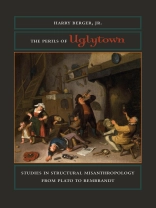With characteristic wit, Harry Berger, Jr., brings his flair for close reading to texts and images across two millennia that illustrate what he calls “structural misanthropology.” Beginning with a novel reading of Plato, Berger emphasizes Socrates’s self-acknowledged failures. The dialogues, he shows, offer up, only to dispute, a misanthropic polis. The Athenian city-state, they worry, is founded on a social order motivated by apprehension—both the desire to take and the fear of being taken. In addition to suggesting new political
and philosophical dimensions to Platonic thought, Berger’s attention to rhetorical practice offers novel ways of parsing the dialogic method itself.
In the book’s second half, Berger revisits and revises his earlier accounts of Italian humanism, Elizabethan drama, and Dutch painting. Berger shows how structural misanthropology helps us to read the competitive practices that characterize Renaissance writing and art, whether in Machiavelli’s constitutional prostheses, Shakespeare’s pageants of humiliation, or the elbow jabs of Dutch portraiture.
Giới thiệu về tác giả
Harry Berger, Jr., was Professor Emeritus of Literature and Art History at the University of California, Santa Cruz. His most recent books are Resisting Allegory: Interpretive Delirium in Spenser’s ‘Faerie Queene’; Harrying: Skills of Offense in Shakespeare’s Henriad; and The Perils of Uglytown: Studies in Structural Misanthropology from Plato to Rembrandt.












